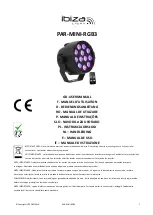
N300-001 and N300-002 Audio Controller
SM60 Installation and Operation Manual
May 26, 2012 Rev: 2.00
Page 2-2
ENG-FORM: 805-0100.DOTX
CONFIDENTIAL AND PROPRIETARY TO ANODYNE ELECTRONICS MANUFACTURING CORP.
2.4
Installation Procedures
2.4.1
Cautions
CAUTION:
In all installations that use the Dynamic microphone capability of the N300,
extreme care must be taken with the shielding and routing of the microphone
wiring. This is especially true of the 5 ohm Dynamic mic input, where typical
signals are in the range of 100
– 250
μ
Vrms. Special wire with Mumetal
shielding should be considered if there are any concerns about installation
related noise. Do not bundle the microphone wiring with high-level lines
(headphone, radio audio, coaxial cables, etc.).
Headset and/or helmet wiring may also need to be reviewed if using Dynamic
microphones. Many of the headsets and helmets on the market have minimal
shielding for the wiring associated with the mic and phone circuits. Those with
shielded wiring often use the Phone Lo connection for the shield ground. In
the N300, the Phone Lo connection is not ground referenced, so the shielding
has no effect. This will result in substantial coupling of the Phone signal onto
the Microphone wires, leading to high levels of crosstalk in the intercom
system. These shielding considerations also apply to in-line PTT cordsets. If a
review of the headset wiring indicates there will be a problem with the shield
termination, it is acceptable to ground the Phone Lo connection to a local
ground at the headset jack/connector.
2.4.2
Cabling and Wiring
All wire shall be selected in accordance with the original aircraft manufacturer's Maintenance Instructions
or AC43.13-1B Change 1, Paragraphs 11-76 through 11-78. Unshielded wire types shall qualify to
MIL-W-22759 as specified in AC43.13-1B Change 1, Paragraphs 11-85, 11-86, and listed in Table 11-11.
For shielded wire applications, use Tefzel MIL-C-27500 shielded wire with solder sleeves (for shield
terminations) to make the most compact and easily terminated interconnect. Follow the connector map in
Section 2.7 as required.
Allow 3" from the end of the shielded wiring to the shield termination to allow the connector hood to be
easily installed. Reference the interconnect drawing in Section 2.7 for shield termination details. Note that
the hood is a "clamshell" hood, and is installed after the wiring is complete. Aircraft harnessing shall
permit the unit to be removed from the panel for easy access to all side adjustments. Do NOT mount the
unit until all adjustments have been performed.
Maintain wire segregation and route wiring in accordance with the original aircraft manufacturers
Maintenance Instructions.
Unless otherwise noted, all wiring shall be a minimum of 22 AWG, except power and ground lines, which
shall be a minimum of 20 AWG. Reference the Interconnect drawing for additional specifications. Check
that the ground connection is clean and well secured, and that it shares no path with any electrically noisy
aircraft accessories such as blowers, turn and bank instruments or similar loads. Power to this unit must
be supplied from a separate circuit breaker or fuse (fast blow), and not attached to any other circuit
breaker without additional protection. Verify that the selected circuit breaker size and wire gauge are
adequate for the installation using the techniques specified in AC43.13-1B Change 1, Paragraphs 11-47
through 11-51 and 11-66 through 11-69.














































